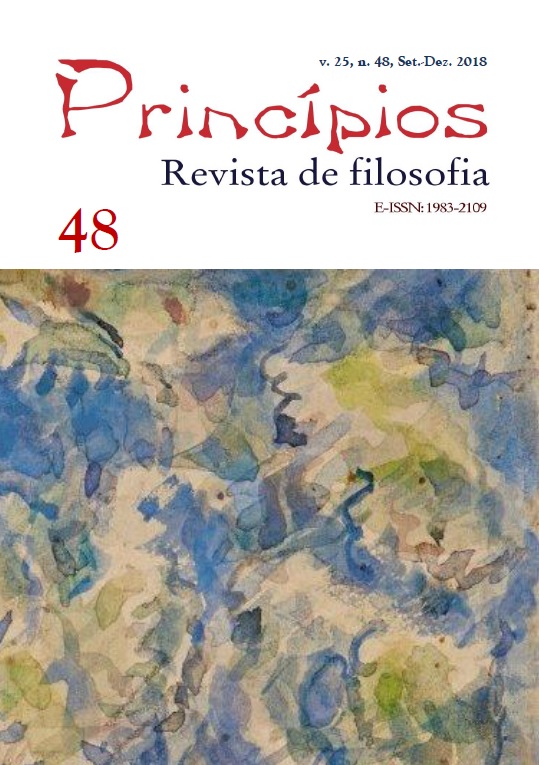Hannah Arendt
a storyteller between past and future
DOI:
https://doi.org/10.21680/1983-2109.2018v25n48ID13924Keywords:
Tradition, Narratives, Hannah ArendtAbstract
This essay presents the link between the thought of Hannah Arendt and the act of narrating. Arendt’s work brings a narrative experience by talking intensively with literature creating new possibilities of relating to the past. In relating human experiences to events in History, Arendt sought to understand how generations of the past had thought and acted publicly in the common world. Between past and future it has been broken the thread of the tradition. The tradition has that selects and names the experiences to be transmitted from an older generation to a younger generation. But even in the gap between past and future, Arendt’s narrative finds “treasures” in the past, stories that constitute a legacy of experiences of a world common to future generations. Understanding human experiences in the past through stories, enables the uniqueness of the new generations to take root in the common world.
Downloads
References
ADICHIE, C. N. O perigo da história única. In: TED – Ideas worth spreading. 2009. Duração: 18m.43s. Disponível em: <https://www.ted.com/talks/chimamanda_adichie_the_danger_of_a_single_story/transcript?language=pt#t-1110073>. Acesso em: 24 jan. 2018.
AGUIAR, O. Pensamento e narração em Hannah Arendt. BIGNOTTO, Newton; MORAES, Eduardo J. (Org.). Hannah Arendt: diálogos, reflexões e memórias. Belo Horizonte: UFMG, 2001. p. 215-226.
AGUIAR, O.; MARIANO, R. A poesia de Hannah Arendt. Revista ArteFilosofia. Ouro Preto, n. 15, dez. 2013, p. 119-132. Disponível em: <https://www.periodicos.ufop.br/pp/index.php/raf/article/view/539/495>. Acesso em: 5 abr. 2018.
ALMEIDA, V. S. Educação em Hannah Arendt: entre o mundo deserto e o amor ao mundo. São Paulo: Cortez, 2011.
ARENDT, H. Lições sobre a filosofia política de Kant. Trad. André Duarte de Macedo. Rio de Janeiro: Relume-Dumará, 1993.
ARENDT, H. Rahel Varnhagen: uma judia alemã na época do romatismo. Trad. Antônio Trânsito e Gernot Kludash. Rio de Janeiro: Relume-Dumará, 1994.
ARENDT, H. Responsabilidade e julgamento. São Paulo: Companhia das Letras, 2004.
ARENDT, H. A dignidade da política: ensaios e conferências. Trad. Helena Martins. Rio de Janeiro: Relume-Dumará, 2006.
ARENDT, H. Compreender: formação, exílio e totalitarismo (1930-1954). Trad. Denise Bottmann. São Paulo: Companhia das Letras; Belo Horizonte: UFMG, 2007.
ARENDT, H. Entre o passado e o futuro. 6. ed. Trad. Mauro W. Barbosa. São Paulo: Perspectiva, 2011.
ARENDT, H. Sobre a revolução. Trad. Denise Bottmann. São Paulo: Companhia das Letras, 2014.
ARENDT, H. Homens em tempos sombrios. Trad. Denise Bottmann. São Paulo: Companhia das Letras, 2015.
ARENDT, H. A condição humana. Trad. Roberto Raposo. 13. ed. Rio de Janeiro: Forense Universitária, 2016a.
ARENDT, H. A vida do espírito. Trad. Abranches Almeida e Martins. 5. ed. Rio de Janeiro: Civilização Brasileira, 2016b.
ARENDT, H. Origens do totalitarismo. Trad. Roberto Raposo. São Paulo: Companhia das Letras, 2016c.
BHABHA, H. K. Ética e estética do globalismo: uma perspectiva pós-colonial. In: BHABHA, H. K. et al. A urgência da teoria. Lisboa: Tinta da China, 2007. p. 21-44.
BLIXEN, K. A festa de Babette e outras anedotas do destino. Trad. Isabel Paquet de Areripe. Rio de Janeiro: Record, 1986.
BRUNER, J. Cultura da Educação. Trad. Abílio Queirós. Lisboa: 70, 2000.
CALVINO, I. Por que ler os clássicos? São Paulo: Companhia das Letras, 2016.
DUARTE, A. O pensamento à sombra da ruptura. Rio de Janeiro: Paz e Terra, 2000.
HAMPATÉ BÂ, A. A tradição viva. In: KI-ZERBO, J. (Ed.). História Geral da África. São Paulo: Cortez; Brasília: UNESCO, 2011.
KAFKA, F. 20 aforismos. Trad. O. M. Carpeaux, Revista do Brasil, Rio de Janeiro, Vol. VI, 3. fasc, n. 56, dez. 1943, p. 33-35.
LAFER, C. Experiência, ação e narrativa: reflexões sobre um curso de Hannah Arendt. Estudos Avançados. São Paulo, v. 21, n. 60, ago. 2007, p. 289-304.
LÉVI, P. É isto um homem? Trad. Luigi Dei Re. Rio de Janeiro: Rocco, 1988.
MAGALHÃES, T. C. Ação, linguagem e poder: uma leitura do capítulo V da obra The Human Condition. In: CORREIA, Adriano. (Org.). Hannah Arendt e a condição humana. Salvador: Quarteto, 2006. p. 35-74.
MATOS, O. O storyteller e o flâneur: Hannah Arendt e Walter Benjamin. In: BIGNOTTO, Newton; MORAES, Eduardo J. (Org.). Hannah Arendt: diálogos, reflexões e memórias. Belo Horizonte: UFMG, 2001.
PORCEL, Beatriz. Pescando pérolas: Hannah Arendt e a ruptura da tradição. In: ENCONTRO Hannah Arendt, 5. O futuro entre o passado e o presente: Anais... Passo Fundo: IFIBE, 2012. p. 49-61.
RICŒUR, P. Educación y política. Buenos Aires: Docencia, 1984.
ROSA, J. G. Grande sertão: veredas. Rio de Janeiro: Nova Fronteira, 1999.
YOUNG-BRUEHL, E. Hannah Arendt’s storytelling. Social Research. v. 44, n. 1, Spring 1977, p. 183-190.
Downloads
Published
How to Cite
Issue
Section
License
Authors retain copyright and grant the journal right of first publication with the work simultaneously licensed under a Creative Commons Attribution License that allows others to share the work with an acknowledgement of the work's authorship and initial publication in this journal.


 Português (Brasil)
Português (Brasil) English
English Español (España)
Español (España) Français (Canada)
Français (Canada)


